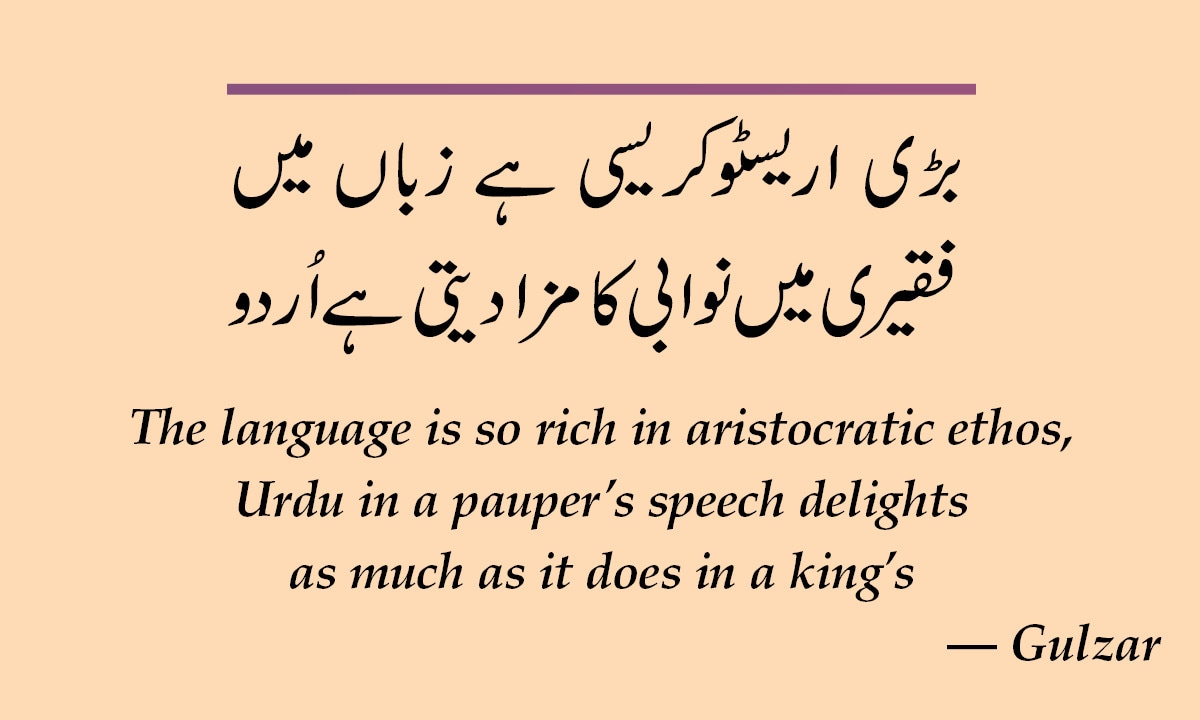by SHAHZAMAN HAQUE

Urdu is a long-time part of Indian culture, not an alien presence to be purged.
If Urdu is guilty of being a foreign tongue,
Who, then, does India belong to? I cannot understand.
–Rashid Banarsi, Indian Urdu poet
As a 9-year-old boy, one evening I went to play in a huge park, Gandhi Maidan, in my hometown of Patna, in India. Among the bustling crowds of mostly young men and children, I found myself alone and decided to wait for my friends for a while on an rusty iron bench. A man in his 30s approached and sat beside me, initiating a conversation and introducing himself as an off-duty member of the Home Guard. Within minutes, he told me that I was not speaking like other people and my pronunciation was like Muhammadens. I was baffled by his remark.
I was unsure how to react to his remark, but he did not seem to be complaining or hostile: on the contrary, he was in awe of discovering another set of sounds seemingly alien to him. Flattered, but also with a sense of discomfort, I noticed that my speech was unnecessarily marking my religion and made me alien in my birthplace. What had gone wrong?
Later, in the year 2001, I joined a French research project on the education system in the Urdu schools of East Delhi. When I met some principals and teachers of these schools, all complained about the lack of funding provided to ensure a proper education. Teachers were not getting their salaries on time, pupils were left unattended in some classes, and some schools did not even have desks or benches, with the children made to sit on a dirty carpet. All blamed the shortages on the negligent way the national central government was treating these Urdu schools. Once again, I got the feeling that Urdu was being treated as alien to Delhi, just as in Patna, although in both places, it has the status of the second official language.
Urdu, which evolved from the Khari Boli language, is a variety of Sanskrit. During medieval times, Khari Boli came into contact with the Muslim invaders in the northwest part of India. Urdu, hitherto known as Hindi, but also by the names of Dehlavi, Hindavai, Rekhta, Gujri, Dakhani, and Hindoostani, was the language of the masses in the area of Delhi and its surroundings.
Some pieces of literature in Khari Boli, with Perso-Arabic-laden script, are found from as early as the 13th century in the texts of the great Delhi Sufi poet and musician, Amir Khusro. However, it was from the 18th century, that, according to Tariq Rahman, Khari Boli was Islamicized under the aegis of the Muslim rulers. All lexicons derived from Sanskrit and local dialects were purged. It was not known as Urdu in those times, but as Hindustani.
Since then, Urdu has been erroneously and relentlessly associated with the Muslim community.
Actually, Urdu’s literary artefacts represent a plethora of cultures, but most prominently, it has been a strong voice of indigenous culture, particularly from the 20th century onwards. Intizar Hussain, Qurraitulain Hyder, Ismat Chughtai, Saadat Hasan Manto, Rajinder Singh Bedi, Premchand, Farhatullah Baig, and Krishan Chandar were all Urdu writers, and many others penned enriching local narratives with the refined aesthetic beauty of Urdu’s Persian and Arabic linguistic and cultural heritage.
As far as Urdu is concerned, in terms of its perception by others, its nativeness is not put into question — its lineage to Sanskrit is often proudly recalled. Instead, it is the alteration of the language, drawing heavily on the dominant Islamic culture of the times, that is problematic for some. The outer surface was embellished with Perso-Arabic script, lexical borrowings mainly from Persian and Arabic, and, corollary to these borrowings, other sounds that have been added to its linguistic system. It was as if Urdu bore the taint of Islam, a bête noire in India’s post-1947 sectarian politics.
The term gharwaapsi (returning back home) was coined by Hindu supremacist groups, such as Hindu Jagran Morcha. Their theory was that every non-Hindu entity in India has its origins in the ethos of Hinduism but has been alienated or converted by force into other faiths. The attempt should be made, therefore, to bring them back to their original, fundamental state: in other words, “returning back home.” Quite a few headlines were abuzz with this theme in the year 2016, when rituals were performed to reconvert some Muslim families to Hinduism.
Oddly, it seems that the gharwaapsi of Urdu had already begun in the early 19th century. Professor Tariq Rahman refers to the “Hinduization of Khari Boli (1803-1949),” undertaken in part to consolidate Hindu identity. One example Rahman cited was Prem Sagar (1803) by Lallu Lal, in which Arabic and Persian words were purged. Known as “Father of Modern Hindi,” Lallu Lal set the tone for Sanskritized Hindi. Following him, several works by Ramchandra Shukla emphasized the importance of Sanskrit Hindi, associating it with the identity of Hindus.
The Diplomat for more
